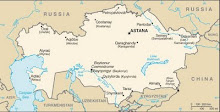At work last week a young patient of mine and I were discussing idioms. Being Israeli, English is not this little one's first (or second) language, and he struggles with phrases whose meanings cannot be determined by the literal definition. Today he came in with a question. "What does 'meant to be' mean?" he asked me. I attempted to explain it to him. "It means that something is destined, or fated to happen." He nodded, and informed me that there is a Yiddish word, "Bashert," that means basically the same thing. I nodded, not thinking too much about it, and then we moved on to his second idiomatic question "What does cut the cheese mean?"
Fast forward to today. It's Yom Kippur, the holiest day of the year in Judaism. I was driving to my first appointment of the day, and I was a little down in the dumps (another good example of figurative language), wondering when I was going to get some news on the Kazakhstan adoption, and second guessing my self for like the millionth time, when all the sudden a truck passed me on the highway. It said "Bashern Towing." Only the "n" was scratched off, so it looked more like a "t." Bashern. Bashert. Meant to be.
Then it hit me. There are no accidents. I'm not so worried about the time frame anymore. It will happen when it is supposed to happen. Somewhere in Kazakhstan there is a little boy who is my son. And I am meant to be his mom.
When I got home, there was an email from my coordinator. Things are moving along, she said. You should hear something soon. I'll keep you posted.
Monday, September 28, 2009
Subscribe to:
Posts (Atom)







